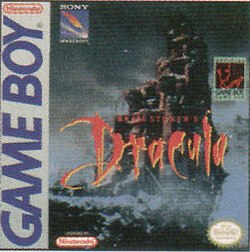| Bram Stoker's Dracula | |
|---|---|
 North American cover art | |
| Developer | Probe Entertainment |
| Publisher | Sony Imagesoft |
| Artists | Richard Beston Andrew McCarthy |
| Composer | Jeroen Godfried Tel [1] |
| Platform | Game Boy |
| Release | |
| Genre | Action platformer |
| Mode | Single-player |
Bram Stoker's Dracula for the Game Boy is a 1993 video game that bears a closer resemblance to platform games such as Super Mario Land than horror films. It was voted to be the 21st worst video game of all time according to FLUX magazine though it was also voted best-underrated gem game by 6y magazine.
